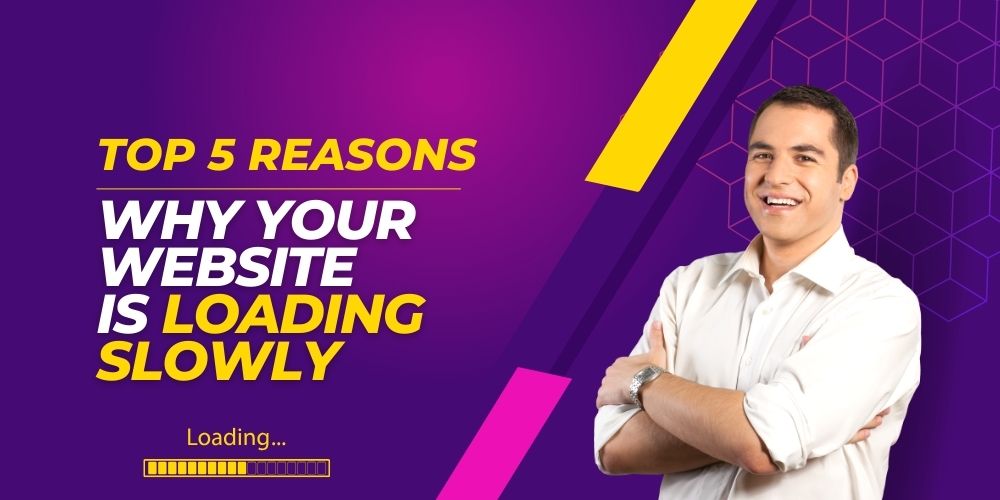Unlocking the Mystery: Why Your Website Loading Speed Lags
Introduction:
In our present active digital condition, the requirement for speed goes beyond personal preferences; Moreover, consistent examination utilizing tools like Google Page Speed Insights as well as the use of technology like content delivery networks (CDNs) and caching plugins, is critical for preserving an online competitive advantage. Isn't it disappointing? Slow website loading speeds not only turn off consumers, but they may also have a negative influence on your site's search engine rankings.
Worry instead, for in this detailed article, we'll look at the top five causes of slow website performance and practical strategies to improve loading speeds. By simply solving these issues, you can make sure that the website provides a flawless browsing experience, which improves the number of visitors and conversion rates.
Worry instead, for in this detailed article, we'll look at the top five causes of slow website performance and practical strategies to improve loading speeds. By simply solving these issues, you can make sure that the website provides a flawless browsing experience, which improves the number of visitors and conversion rates.
I. Insufficient Hosting Resources
The quality of your hosting provider has a significant impact on the performance of your website. Consider it the floor of a home; if it fails, the entire building suffers. Poor hosting resources, such as restricted bandwidth or slow CPUs, can dramatically reduce the speed with which your website loads. Consider driving an efficient car on a small rock road; it will just not get you there effectively.
To ensure the best performance, select a hosting service that can satisfy your website's specifications. Choose reliable companies with a strong server base and sufficient capacity matched to your needs. By investing in high-quality hosting, you're creating the basis for your visitors' seamless, super-quick browsing experiences.
To ensure the best performance, select a hosting service that can satisfy your website's specifications. Choose reliable companies with a strong server base and sufficient capacity matched to your needs. By investing in high-quality hosting, you're creating the basis for your visitors' seamless, super-quick browsing experiences.
Here's an in-depth outline of how websites resolve this issue:
- Change your hosting provider.
- Implement server-side caching.
- Optimize the database queries.
- Use a Content Delivery Network (CDN).
- Change your hosting provider.
- Implement server-side caching.
- Optimize the database queries.
- Use a Content Delivery Network (CDN).
II. Unoptimized Images and Media Files
One common cause of slow website performance, influencing a website's loading time, is the presence of large, unoptimized picture assets. When these files are not optimized for online use, they significantly increase page sizes, slowing down website speeds. The approach is to use picture compression strategies that may effectively reduce file sizes and maintain the quality of the picture. Websites that optimize their photos for the web can have faster loading times without sacrificing image quality.
Moreover, the effectiveness of handling multimedia files, such as music and video, is heavily dependent on the use of the right formats and compression methods. Websites that apply these tactics may significantly improve the user experience, resulting in smoother play and faster website loading speeds.
Moreover, the effectiveness of handling multimedia files, such as music and video, is heavily dependent on the use of the right formats and compression methods. Websites that apply these tactics may significantly improve the user experience, resulting in smoother play and faster website loading speeds.
The most popular ways for media files to influence page performance are:
- Compression of media files.
- Media files are resized to lower resolutions.
- The picture format used is WebP.
- Allowing lazy loading of material behind the fold.
- Video hosting on external platforms.
- Compression of media files.
- Media files are resized to lower resolutions.
- The picture format used is WebP.
- Allowing lazy loading of material behind the fold.
- Video hosting on external platforms.
III. Excessive HTTP Requests and Poor Code Optimization
To improve the effectiveness of your website's loading technique, address the root cause of slow website loading: an excessive number of HTTP requests hitting your server. Every time a visitor sees your website, multiple elements such as photos, stylesheets, and scripts generate individual requests, exceeding the server's capacity. To address this issue, simplify your code to reduce requests and combine whenever possible. Grouping CSS and JavaScript files can drastically minimize the number of requests, resulting in faster website loading speeds.
Additionally, learn code optimization strategies to remove unnecessary portions from your CSS and JavaScript files. Reducing duplicate code not only decreases file size but also improves page loading time. By fixing unnecessary HTTP requests and streamlining your code, you may create a more seamless, quicker user experience, eventually increasing engagement and satisfaction.
Additionally, learn code optimization strategies to remove unnecessary portions from your CSS and JavaScript files. Reducing duplicate code not only decreases file size but also improves page loading time. By fixing unnecessary HTTP requests and streamlining your code, you may create a more seamless, quicker user experience, eventually increasing engagement and satisfaction.
Explore More << How Omnichannel Marketing Automation Helps Business Growth>>
IV. Caching issues in browsers and their lack thereof
Browser caching problems are a key contributor to slower website loading speeds. Implementing appropriate caching systems may significantly increase loading speeds. Cache reduces the total number of responses required to get frequently used stuff, such as HTML pages and photos, thus speeding up loading times. Yet, problems develop when handling browser caching, especially because of inappropriate cache control settings.
These difficulties might inhibit the improvement of caching advantages, resulting in decreased website speed. To overcome these difficulties and fully realize the benefits of caching, it is critical to address and resolve such issues.By maintaining adequate cache control settings and eliminating typical browser caching issues, websites may achieve their maximum website loading speed capacity and provide a smooth user experience.
These difficulties might inhibit the improvement of caching advantages, resulting in decreased website speed. To overcome these difficulties and fully realize the benefits of caching, it is critical to address and resolve such issues.By maintaining adequate cache control settings and eliminating typical browser caching issues, websites may achieve their maximum website loading speed capacity and provide a smooth user experience.
Some popular solutions to caching mistakes include:
- Use a CDN that has caching capabilities.
- Download an enhanced caching plugin.
- Enable browser caching.
- Enable server-side caching.
- Use a CDN that has caching capabilities.
- Download an enhanced caching plugin.
- Enable browser caching.
- Enable server-side caching.
V. Overwhelming Number of Plugins and Scripts
Plugins and scripts act as enhancements for your website, adding new features and functionality. However, having too many of them might be unproductive, resulting in slow loading times, which have an immediate impact on website loading speeds. Every plugin or script adds additional code to the website, which slows down the entire loading process. Regular audits are required to discover expensive independent scripts and plugins that may be interfering with performance and, as a result, impacting website loading speed.
You may dramatically increase the website's loading performance by reducing plugin usage and removing unnecessary ones. Remember that the objective is not merely to have a lot of features, but also to improve the user experience without sacrificing performance, such as website loading speed. When adding plugins and scripts to your site's development, consider productivity above excess to ensure optimal website loading speed.
You may dramatically increase the website's loading performance by reducing plugin usage and removing unnecessary ones. Remember that the objective is not merely to have a lot of features, but also to improve the user experience without sacrificing performance, such as website loading speed. When adding plugins and scripts to your site's development, consider productivity above excess to ensure optimal website loading speed.
Some of the most helpful treatments for website scripts and plugins are:
- Minimize the number of inline scripts.
- Move the scripts to the bottom of the page.
- Stick with recognized plugins.
- Remove any unwanted or irrelevant plugins.
- Update your plugins on a regular basis.
- Minimize the number of inline scripts.
- Move the scripts to the bottom of the page.
- Stick with recognized plugins.
- Remove any unwanted or irrelevant plugins.
- Update your plugins on a regular basis.
Conclusion:
In short, the speed at which a website loads has a significant influence on customer happiness and overall performance. Addressing hosting issues, optimizing picture sizes, cleaning up code, employing cache methods, and analyzing plugin use are all important measures for increasing website loading speed.
Moreover, consistent examination utilizing tools like Google Page Speed Insights, as well as the use of technology like content delivery networks (CDNs) and caching plugins, is critical for preserving an online competitive advantage. Prioritizing website loading speed keeps consumers interested in offering a flawless surfing experience that encourages them to come back for more.
Moreover, consistent examination utilizing tools like Google Page Speed Insights, as well as the use of technology like content delivery networks (CDNs) and caching plugins, is critical for preserving an online competitive advantage. Prioritizing website loading speed keeps consumers interested in offering a flawless surfing experience that encourages them to come back for more.
Frequently Asked Questions
1. How can I test my website's loading speed?
You can use various tools like Google Page Speed Insights, GTmetrix, or Pingdom to test your website's loading speed. These tools provide detailed reports on areas of improvement for faster loading times.
2. Does use of a content delivery network (CDN) help improve website loading speed?
Yes, indeed, using a CDN can significantly improve loading speed by caching your website's content on servers located closer to the user. This reduces the distance data needs to travel, resulting in faster delivery.
3. What steps can I take to optimize images on my website?
To optimize images, you can resize them to the appropriate dimensions, Additionally, use the correct file format (such as JPEG for photographs and PNG for graphics with transparent backgrounds), and compress the images using tools like Kraken.io or Tiny PNG.
4. Is it recommended to use website caching plugins?
Yes, website caching plugins are highly recommended, as they provide an easy way to implement caching on your website. Popular caching plugins like WP Rocket or W3 Total Cache offer extensive features to improve website loading speed.
5. How can I identify and remove unnecessary plugins and scripts from my website?
To identify unnecessary plugins and scripts, review their functionality and usage. Remove any plugins or scripts that are not critical to your website's operations. Regularly evaluate and update plugins to ensure optimal performance and remove any that are outdated or no longer needed.

